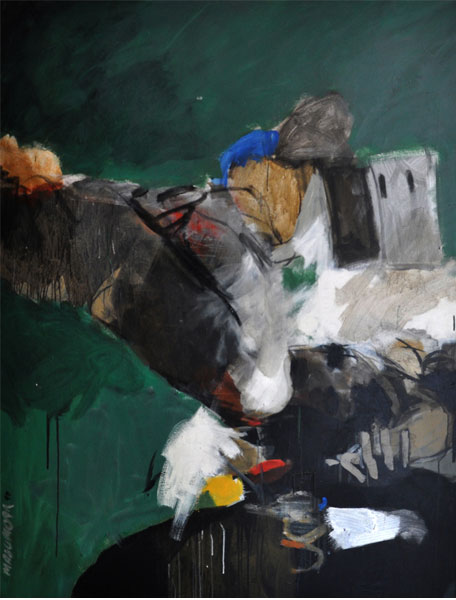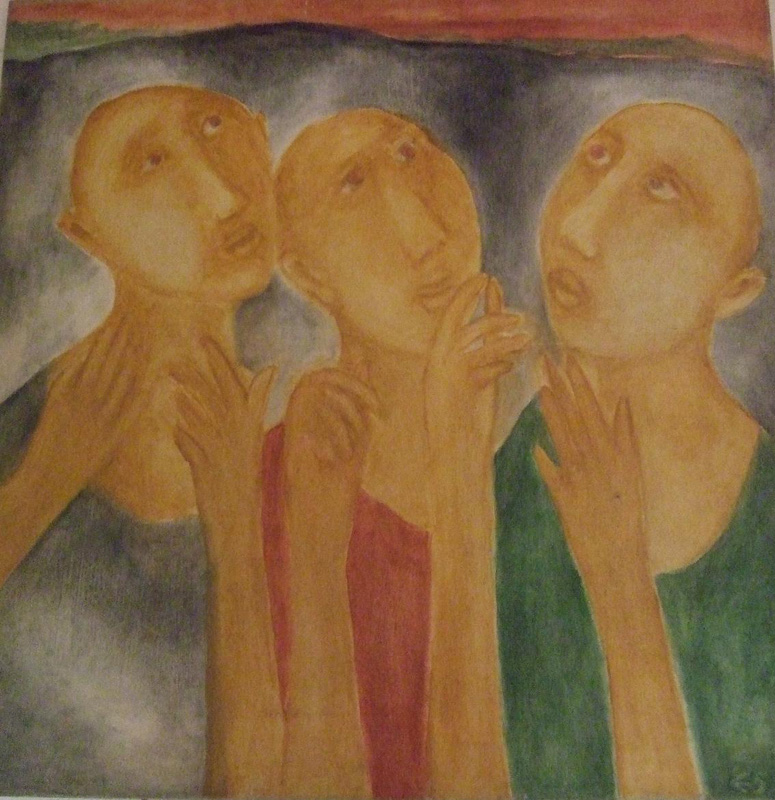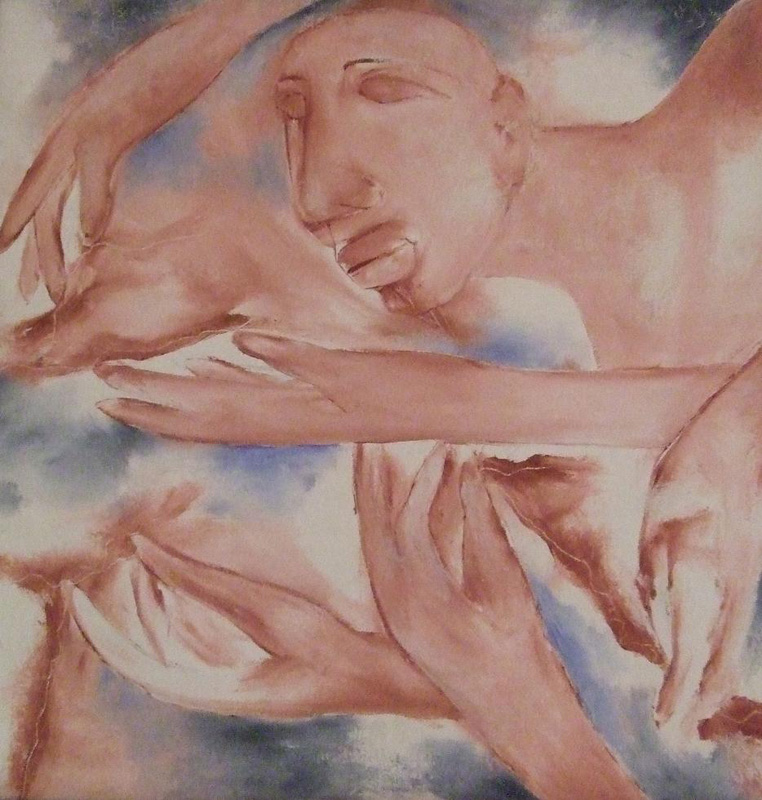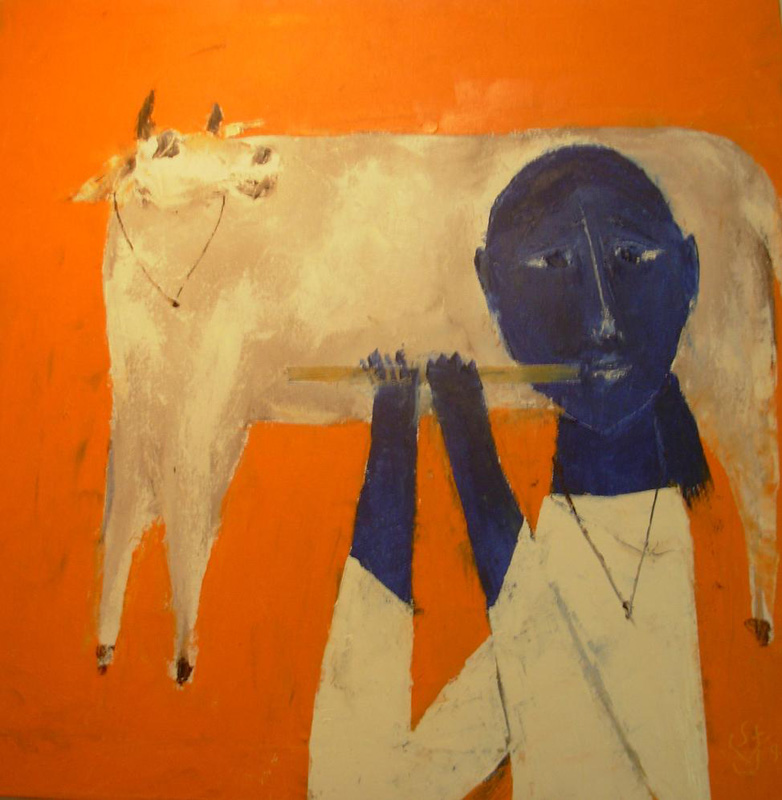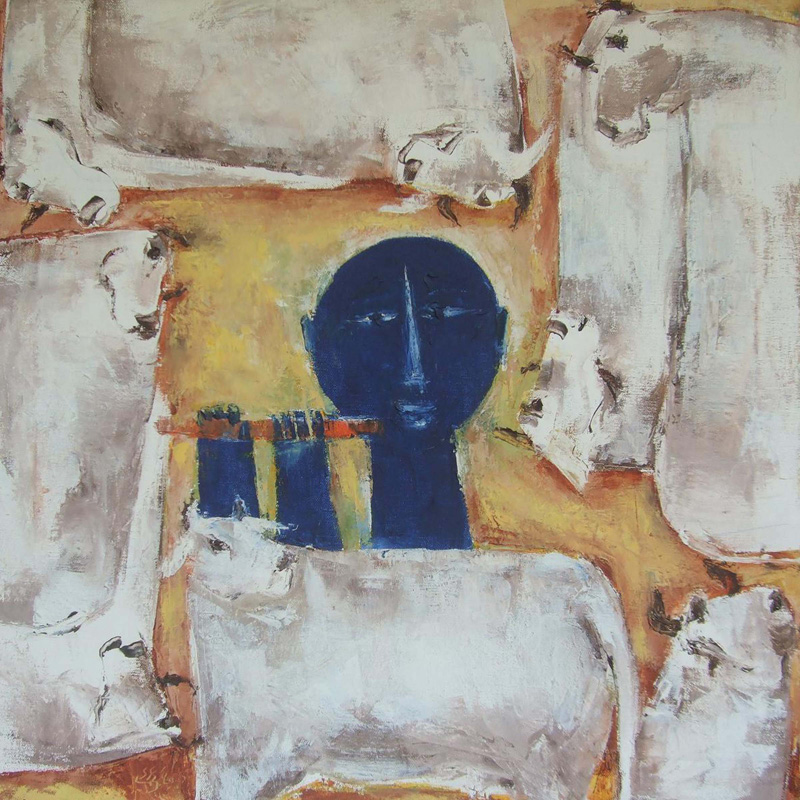Haku Shah
An eminent painter he is also a cultural anthropologist, teacher, Gandhian, an author of international repute on folk and tribal art. He is a recipient of several honours including the
Padma Shri, Gagan Abani Purashkar, the Kala Shiromani, the Nehru Fellowship, the Rockefeller Fellowship, Kala Gaurav and the Kala Ratna for his contribution to art.
He was born in 1934 at Valod, in the state of Gujarat. After finishing Fine Arts at M.S. University, Baroda he taught at a Gandhian Ashram, Vedchhi in South Gujarat. Associated with the National Institute of Design right from its inception in the early 1960’s, he was invited by Dr. Stella Kramrisch in 1967 to curate the seminal exhibition, “Unknown India” which traveled to USA. He established a tribal museum at Gujarat Vidyapeeth in Ahmedabad, which was set up by Mahatma Gandhi. He has conducted various art and design workshops and lectured across the world. He also taught at School of Architecture, Ahmedabad for several years and was Regent Professor at the University California, Davis. He has exhibited his art in India and across the world. Haku Shah is Chairman and founder trustee of Bhooma, Lok Shilpa Sansthan, Ahmedabad where he lives and paints.
Education:
1955 B.F.A., Fine Arts, M.S. University of Baroda, Gujarat
1959 M.F.A., (Fellow) Fine Arts, M.S. University of Baroda, Gujarat
Awards and Honours:
1968 Rockefeller Fellow, U.S.A.
1971 Nehru Fellowship Award, New Delhi
1973 Civic Award, Municipal Corporation, Ahmedabad
1989 Padma Shri Award for Art, President of India
1991 Regents’ Professor, University of California, U.S.A.
1997 Kala Ratna, All India Fine Arts & Crafts Society, New Delhi
1998 Kala Shiromani, Lalit Kala Akademi, Ahmedabad
2006 Gagan Abani Puraskar, Shantiniketan
2011 Sanmaan, Municipal Corporation, Ahmedabad
Professional Experience:
1955-57 Teacher, Uttar Bunyadi Vidyalaya Basic Training College, Vedchhi Ashram, Surat
1959-62 Designer (Handlooms), Weavers Service Centre, Government of India
1962-67 Researcher/Designer, National Institute of Design, Ahmedabad
1968 Curator of the exhibition “Unknown India”, Philadelphia Museum of Art
1969-‘99 Curator, Tribal Museum, Gujarat Vidyapith, Ahmedabad
1975 Lecture Tour in USA on “Tribal and Folk Art”
since 1978 Advisor, Mingei International Museum, San Diego
1980 Trustee, Craftsmen’s Aid Fund, Gujarat Handicraft and Handlooms Corporation
1980 Adjunct faculty, The School of Architecture, Ahmedabad (Organized by Dr. Stella Kramrisch)
1991 Regents’ Professor, Department of Environmental Design,
1995 Visiting Professor, School of Interior Design, Ahmedabad
Solo Exhibitions of Paintings:
1961 Ashok Gallery, Calcutta
1962 Ashok Gallery, Calcutta
1963 Jehangir Art Gallery, Bombay
1964 Jehangir Art Gallery, Bombay
1967 Chemould Gallery, Bombay
1968 International House, Philadelphia University of California, Davis Academy of Arts, Calcutta Private Garden, Delhi The Art Scene Today, Chemould Gallery, Bombay Asia Foundation Gallery, San Francisco City Art Museum, St. Louis
1969 Chemould Gallery, Bombay
1971 Sanskar Kendra, Ahmedabad
1975 Chemould Gallery, Bombay
1976 Gallery One, New York
1984 Academy of Fine Arts, Calcutta
1988 Aressa Gallery, Bombay
1991 Bade Museum, Berkeley, USA
1993 Art Heritage, New Delhi
1994 Chemould Gallery, Bombay
1996 Cymroza Gallery, Bombay
1997 Noor Gandhi Ka Maeri Nazar Main, The Village Gallery, New Delhi Noor Gandhi Ka Maeri Nazar Main, India International Centre, New Delhi The Gallery, Chennai, Art Indus, New Delhi Herwitz Art Gallery, Ahmedabad Lalit Kala Akademi, Chandigarh
1998 Durban Art Gallery, Cape Town, South Africa
1999 All India Fine Arts & Crafts Society, New Delhi
2000 Birla Academy of Art & Culture, Mumbai
2002 Haman Hai Ishq, Visual Art Gallery, India Habitat Centre, New Delhi
2004 Coomarswamy Hall, Prince of Wales Museum, Mumbai
2005 Shridharani Gallery, New Delhi
2007 Time & Space Gallery, Bangalore
2008 Tao Art Gallery, Mumbai
2009 Maanush, India International Centre, New Delhi Sarjan Art Gallery, Vadodara Cima Gallery, Kolkata Marvel Art Gallery, Ahmedabad Digital prints based on children’s story book “Man Pari”, Alliance Française, Bangalore Visual Art Gallery, India Habitat Centre, New Delhi Emami Chisel Art Gallery, Kolkata, Marvel Art Gallery, Ahmedabad
2010 Marvel Art Gallery, Ahmedabad
2011 Kanoria Art Gallery, Ahmedabad
2014-15 “Nitya Gandhi – Living Reliving Gandhi”. Opening show at the Sabarmati Ashram, Kalavithika Art Gallery, Ahmedabad Ahmedabad, The show travels to Mumbai, New Delhi and Bangalore. Archer Art Gallery, Art Indus Gallery, Cymroza Gallery, Time and Space gallery
Solo Exhibitions of Photographs:
1992 India International Centre, New Delhi
1994 Art Inborn, Centre for Photography as an Art Form, NCPA, Bombay
2006 Alliance Française, Bangalore
Exhibitions / Major Projects:
1979 Process of Technology, concept, curation, design and installation, Tropen Museum,
1981 Village Vasna, concept and design, Museum of Mankind, London
1983 Form and Many Forms of Mother Clay, concept, curation, design and catalogue; Crafts
1986 The Art of the Adivasis, commissioner, concept and design, Festival of India, Japan
1988 Form Colour and Creativity, curator, concept and design, Crafts Museum, New Delhi
1989 Shilpagram, created permanent habitat as museum for revival of folk and tribal arts to Amsterdam Museum, New Delhi and Mingei International, San Diego
1990 Shilpa Mela, Arts and Crafts Fair at Ahmedabad; visualizer, designer and consultant, for
1991 Apna Utsav, Arts and Crafts Fair at Mumbai; visualizer, designer and consultant, for
1998 Panchatantra, special exhibition for IGNCA, New Delhi.
Other:
1967 Collection of objects loaned to the exhibition “Unknown India”, USA
1969 Exhibition for IDP, Khadi& Village Industries Commission, Bombay, for the Gandhi interact with contemporary plastic and performing art, concept and design; Udaipur, Rajasthan, India. Handicrafts Corporation, Government of Gujarat. Government of India.
1974 Curated, Conceptualized and designed an exhibition on Applique Art for the Anneberg
1975 Indian Textile Exhibition at the Center for Textile Art, Berkeley Centenary programmes Worked on section of village ritual art in the Gandhi Centenary Exhibition, London
Gallery, San Francisco Exhibition of personal collection of folk art, with slide show, Chemould Gallery, Bombay Floral designs and textiles exhibited at The Egg & Eye museum, Los Angeles
1977 Design Consultant for Agri-Expo exhibition, National Institute of Design New Delhi
1978 Designer and curator for the exhibition “Man and Technology”, Tropen Museum, Amsterdam
1979 Conceptualized, visualized and designed, Sardar Patel Museum in Bardoli, Government
1980 Exhibited tribal paintings, terracotta, photographs, textiles, etc. for the Faculty of Fine
1981 Loaned his personal collection to Mingei International Museum, San Diego Consultant to National Institute of Design for the permanent “India” Exhibition at the Commonwealth Institute, London of Gujarat. Arts, M.S. University, Baroda Designed and executed Tribal Museum at Udaipur, Rajasthan Consultant curator and Designer, Museum of Mankind, London, for its village exhibit at the Festival of India, London Organized a special exhibition of personal collection of objects, photographs, textiles, etc. and a talk at the Sanskar Kendra (Museum), Ahmedabad
Associations:
1979 Member, Handicrafts Board of India
Board Member, National Academy of Art, India
Member, Rare-form Committee, Sangeet Natak Akademi, Delhi
Member, National Museum of Man, Bhopal;
Member, Tribal Museums Committee, Government of Gujarat
Committee for the Preservation and Promotion of Folk and Tribal Art in India, Ministry of
Education, Government of India
1981-82 Member, Lalit Kala Akademi, Gujarat
1989 Member of the National Working Group “On Culture”, and specialty subgroups on museums, galleries and oral traditions for the VIII Plan, Government of India
Member of the Advisory Committee, West Zone Cultural Centre,Government of India
Member of the Program Committee, West Zone Cultural Centre, Government of India
1993-94 Member of the Purchase Committee, National Museum, New Delhi
1994-95 Member of the Purchase Committee, Gallery of Modern Art, New Delhi
1994-96 Member of the Advisory Committee, Roopankar, Bharat Bhavan, Bhopal
1996 Member Steering Committee on Education and Culture for IXth Plan, Planning
Commission, Government of India, New Delhi
Films:
1978 “Pithoro, the Tribal God”, for the Lalit Kala Akademi, New Delhi
1970 “Scraps”, made with Yvonne Hannemann, Ahmedabad and USA
Creativity Workshops:
1985 “Hands”, National Institute of Design, Ahmedabad
1987 “Sun”, by Craft Council of India, Madras
1988 “River”, Environmental Society of Trichinapalli, Tamil Nadu
1989 “Hands”, Rhode Island School of Design, Providence
1991 “Hands”, University of California, Davis
Lectures:
1969 St. Louis Museum, Chicago; University of California, Davis; University of California, Oakland; Charles Eames’ residence, Los Angeles; San Francisco College of Art; Oaxaca,Mexico
1969, 1975 Mrs. and Mr. Rossbach’s, Berkeley, USA.
1970 Seventh All-India Museum Camp, Baroda, India.
1972 Museum Rietberg, Zurich, for the North Indian Folk Tribal and Classical Art Exhibit;
1973 Sanskar Kendra, Ahmedabad, India.
1975 Williamstown College, Trenton, New Jersey; New York Mercy County Community
Basel, Museum für Völkerkunde; Bombay, Museum Society.
College; Asia Society, New York Design School; Asia Society, New York;
University of Pennsylvania, Philadelphia; Cranbrook Design School, Art History Section,
University of Minneapolis, Minnesota; Fiberworks, Berkeley, California; University Art
Museum, Santa Barbara; University of California, Los Angeles; The Egg & Eye, Center for Folk Arts and Crafts and Ethnic Council, San Diego, California; Peabody Museum,
Harvard University; University of Pittsburgh; Dharwad University, Karnataka.
1976 International House, Tokyo
1978 Visual Arts Centre, Ahmedabad
1979 Seminar Vision and Visualization, Tropen museum, Amsterdam
1980 Extramural Lectures with Exhibition (Fine Arts Faculty), M.S. University, Baroda
1982 Public lectures on Arts and Crafts of India; invited by Mingeikan, Tokyo
1985 Creativity Inborn at Smithsonian Institute, USA.
1987 Living Traditions of India, Kyoto, Japan, organized by friends of India and Japan,
1989 Textiles and Village India, Iowa University, Ames, USA.
UNESCO, Paintings by the Rathwa Tribes, Philadelphia Museum of Art as a part of the exhibition “Painted Delight” for Festival of India. USA.
Votive Terracottas of Gujarat, Mingei International, as a part of the exhibition
Form and Many Forms of Mother Clay, San Diego,
Creativity and Arts and Crafts of India, Conway University, Arkansas
Textiles and Village India, University of California, Berkeley
1999 Maker and Making, Chennai
2000 Slide Lecture at MORCRAFT, NCPA, Mumbai
2003 Votive Terracotta of Gujarat and Pithoro the Tribal God, MuseeCanadien Des
2011 Artists on Art—A dialogue of Prof. AlokRai with Haku Shah, Lalit Kala Akademi,
Art In-Born, Birla Century Art Gallery, MumbaiPithora Baba - The painted God of Tribals, Children’s Creativity Center, Prince of WalesMuseum, MumbaiCivilizations, Canada
New Delhi.Kalpana Darshan, Vishwakosh, Lalit Kala Kendra, Kalavithika Art Gallery, Ahmedabad.
Publications:
1969 Community Ancestor Worship, (in Gujarati, Hindi and English, 45 pp., plus plates),
Gujarat Vidyapith, Ahmedabad. (withVimal Shah and Ramesh Shroff)
1970 Rural Craftsmen and their work, equipment and techniques in the Mer village of Ratadi
in Saurashtra, India (227 pp., 354 plates), National Institute of Design Ahmedabad. (with Eberhard Fischer)
1971 Schlichter Eintrag-Ikat aus Süd-Gujarat, Indien, Die Herstellung von Lendentüchern für
die Chaudhri-Stämme in Mandvidurch Khatri-Weber in Tribus Vol. 19:47-69 (16 plates),
Linden-Museum, Stuttgart. (with Eberhard Fischer)
1971 Mogra Dev,tribal crocodile gods of the Chodhri, Gamit and Vasava tribes, South Gujarat,
India (43 pp., 55 plates), Gujarat Vidyapith, Ahmedabad. (with Eberhard Fischer)
1972 Kunsttraditionen in Nordindien: Stammeskunst, Volkskunst, klassische Kunst,
(64pp.,200 plates) Museum Rietberg Zürich. (with Eberhard Fischer)
1973 Simple weft-ikat from South Gujarat, India, (19 pp. and 7 plates), Calico Museum of
Textiles, Ahmedabad. (with Eberhard Fischer).
1973 Vetra ne khambha, memorials for the dead, wooden figures and memorial slabs of the
Chodhri, Gamit and Vasava tribes, South Gujarat, India (60 pp., 65 plates), Gujarat
Vidyapith, Ahmedabad. (with Eberhard Fischer)
1974 Tatauieren in Kutch, in Ethnologische Zeitschrift Zürich Vol.2:105-129,
Völkerkundemuseum Zürich. (with Eberhard Fischer)
1975 Kites flourishing in Ahmedabad, India, in Asian Culture Center for UNESCO.
1976 Treatment against Ghosts and Spirits, the Bhagtai-ceremony of the Chodhri tribe in Gujarat, in German Scholars on India, vol.2:51-60, Bombay. (with Eberhard Fischer)
1978 Folk Myth and Tribal Magic, Art Heritage exhibition catalogue no.1.
1979 More lights on the Harappan Terracotta Figures, in The Eastern
Anthropologist (with Suman Pandya)
1980 The ritual paintings of the god Pithora Baba, Zürcher Zeitschrift für Ethnologie, vol.
11: 7-62.
1982 Tempeltücher für die Muttergöttinnen in Indien, Zeremonien, Herstellung und
Ikonographie gemalter und gedruckter Stoffbilder aus Gujarat, (245pp., 461 plates), Museum
Rietberg Zürich. (with Eberhard Fischer and Jyotindra Jain)
1982 The Voice that Paints, in Shilpakar, pp. 77-87, Crafts Council of Western India, Bombay.
1984 On Art and Ritual, India International Centre Quarterly, vol. 11, no.4:14-33, 19 plates, New Delhi.(Interview with Geeti Sen)
1985 Form and many Forms of Mother Clay, Contemporary Indian Pottery and Terracotta (with contributions by Pupul Jayakar, C. Sivaramamurti and Stella Kramrisch) exhibition catalogue for the National Crafts Museum, New Delhi.
1985 Votive Terracottas of Gujarat, Mapin Publishers, Ahmedabad. (edited by Carmen Kagal)
1985 Gopal, ein indischer Balladensänger zeichnet sein Leben, Jogi Gopal gay chhe, Gopal chitrechhe(German and Gujarati, 56 pp., 46 plates) Peter Hammer Verlag, Wuppertal. (with Barbara and Eberhard Fischer)
Gopal singt, Lieder eines indischen Balladensängers und Zeichners, tape and leaflet of songsby Gopal.
1987 Some 19th century garâs pataor jajmâniî documents of Muslim potters in Kutch, inVerhandlungen der Naturforschenden Gesellschaft, Basel,vol. 97:103-120, Museum für Völkerkunde Basel. (with Eberhard Fischer)
1991 Mati in IndigeniousVisions, India International Centre Quarterly, New Delhi. (interview with Geeti Sen)
1992 “Teju” means radiating light, in Brunner and Vogelsanger edit. Teju zeichnet, aus den Malheften einer indischen Familie (pp. 5-12), Völkerkundemuseum der Universität Zürich.
1992 Contemporary streams of tribal and folk art, exhibition catalogue New South Wales Gallery, Australia.
2009 Maanush, Biographical notes, in Hindi edited by Piyush Daiya, Published by Rajkamal
Prakashan, New Delhi
2011 Sanchayita: Essays and Articles by Haku Shah, compiled and translated by Piyush Daiya, Published by Vagdevi Prakashan, Bikaner
In addition articles appeared in several journals including Illustrated Weekly of India,
Swissair Gazette, Inside/Outside, Graphis, Cenus Gazetteers, VisvaBharati Quarterly,
Adivasi Gujarat, VishwaGurjari, Panchvani, Parab, etc.
Children’s Books
1994 Champa, (in English, Gujarati, Bengali, Hindi) written and illustrated, Published by
1998 Dharti, (Hindi, Gujarati) written and illustrated by Haku Shah, Published by Indira Gandhi SAHMAT, New Delhi
National Centre for Arts, New Delhi
1998 Somi, (Hindi, Gujarati)written by Haku Shah and illustrated by Govind Bharthari, Published by Indira Gandhi National Centre for Arts, New Delhi
2007 Jeevi aurJeetu, (Hindi) written and illustrated by Haku Shah, Published by Vatsal
Prakashan, Bikaner
2007 Goth, (Hindi) written by Haku Shah and illustrated by Govind Bharthari, Published by Vatsal Prakashan, Bikaner
2007 Manapari, (English) written and illustrated by Haku Shah, Published by Shivshakthi,Bangalore
Publications dedicated to Haku Shah
1980 Indische Stoffbilder, Figürliche Applikationen einer Schuhmachersfrau in Gujarat, Frankfurt a.M.(Insel Verlag) Barbara Fischer, 1980
1999 Invisible Order Tribute to Haku Shah, Festschrift voulme edited by Dr. Eberhard Fischer, Published by Art Indus, New Delhi
